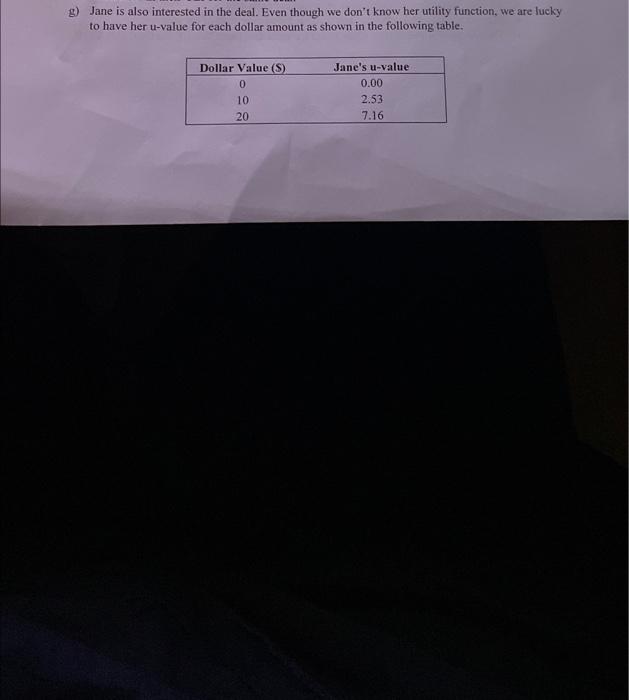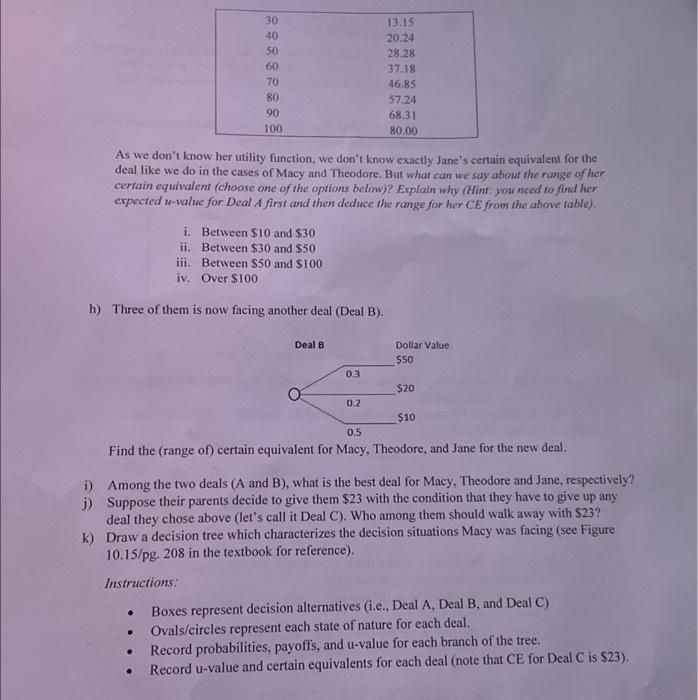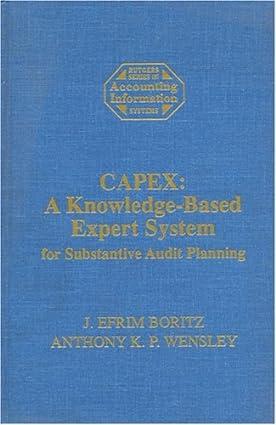Answered step by step
Verified Expert Solution
Question
1 Approved Answer
given all info g) Jane is also interested in the deal. Even though we don't know her utility function, we are lucky to have her


given all info
g) Jane is also interested in the deal. Even though we don't know her utility function, we are lucky to have her u-value for each dollar amount as shown in the following table. As we don't know her utility function, we don't know exactly Jane's certain equivalent for the deal like we do in the cases of Macy and Theodore. But what can we say about the range of her certain equivalent (choose one of the options below)? Explain why (Hint: you need to find her expected u-value for Deal A first and then deduce the range for her (E from the above table). i. Between $10 and $30 ii. Between $30 and $50 iii. Between $50 and $100 iv. Over $100 h) Three of them is now facing another deal (Deal B). Find the (range of) certain equivalent for Macy, Theodore, and Jane for the new deal. i) Among the two deals (A and B), what is the best deal for Macy, Theodore and Jane, respectively? j) Suppose their parents decide to give them $23 with the condition that they have to give up any deal they chose above (let's call it Deal C). Who among them should walk away with $23 ? k) Draw a decision tree which characterizes the decision situations Macy was facing (see Figure 10.15/pg.208 in the textbook for reference). Instructions: - Boxes represent decision alternatives (i.e., Deal A, Deal B, and Deal C) - Ovals/circles represent each state of nature for each deal. - Record probabilities, payoffs, and u-value for each branch of the tree. - Record u-value and certain equivalents for each deal (note that CE for Deal C is \$23). g) Jane is also interested in the deal. Even though we don't know her utility function, we are lucky to have her u-value for each dollar amount as shown in the following table. As we don't know her utility function, we don't know exactly Jane's certain equivalent for the deal like we do in the cases of Macy and Theodore. But what can we say about the range of her certain equivalent (choose one of the options below)? Explain why (Hint: you need to find her expected u-value for Deal A first and then deduce the range for her (E from the above table). i. Between $10 and $30 ii. Between $30 and $50 iii. Between $50 and $100 iv. Over $100 h) Three of them is now facing another deal (Deal B). Find the (range of) certain equivalent for Macy, Theodore, and Jane for the new deal. i) Among the two deals (A and B), what is the best deal for Macy, Theodore and Jane, respectively? j) Suppose their parents decide to give them $23 with the condition that they have to give up any deal they chose above (let's call it Deal C). Who among them should walk away with $23 ? k) Draw a decision tree which characterizes the decision situations Macy was facing (see Figure 10.15/pg.208 in the textbook for reference). Instructions: - Boxes represent decision alternatives (i.e., Deal A, Deal B, and Deal C) - Ovals/circles represent each state of nature for each deal. - Record probabilities, payoffs, and u-value for each branch of the tree. - Record u-value and certain equivalents for each deal (note that CE for Deal C is \$23) Step by Step Solution
There are 3 Steps involved in it
Step: 1

Get Instant Access to Expert-Tailored Solutions
See step-by-step solutions with expert insights and AI powered tools for academic success
Step: 2

Step: 3

Ace Your Homework with AI
Get the answers you need in no time with our AI-driven, step-by-step assistance
Get Started


